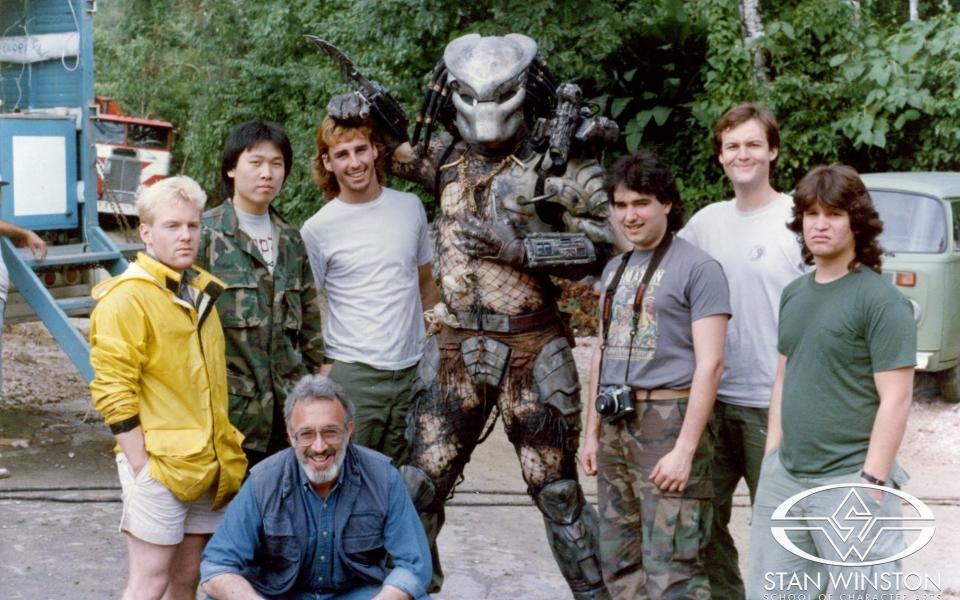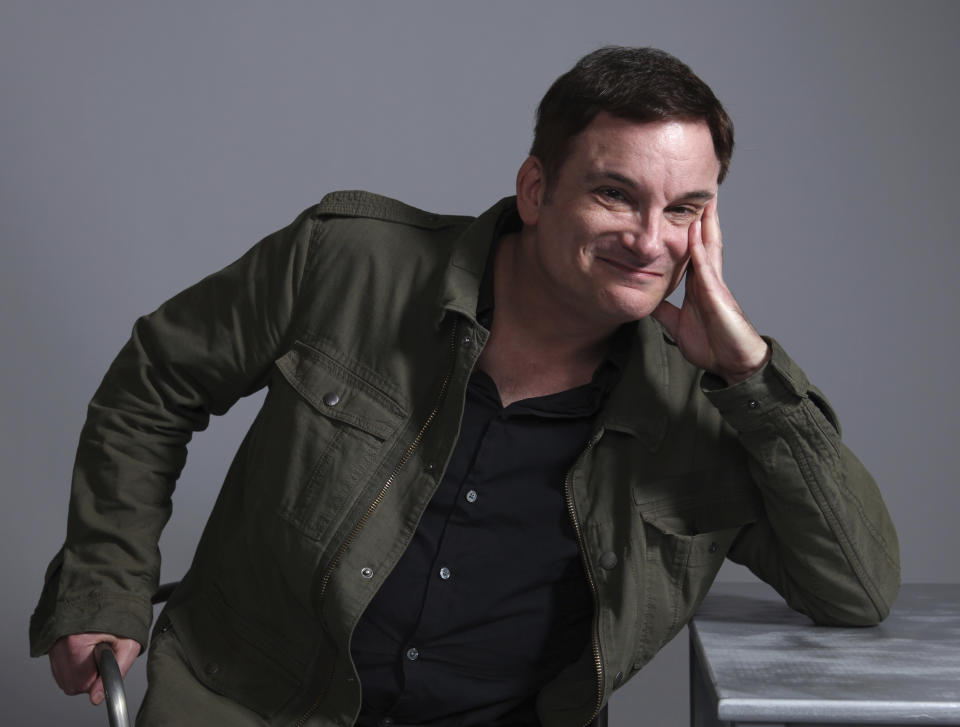A brief history of 'Predator'

With the latest Predator movie, The Predator, arriving in cinemas next month, it’s worth taking a look back at how we got to this point.
Fusing a men-on-a-mission movie with the idea of a creature picking them off one by one like a big game hunter from a world beyond our own, 1987’s Predator has seared itself into the imagination of audiences, brought the world one of the most iconic movie monsters of all time, and spawned a series of films.
The Predator movies began life with sibling screenwriters Jim and John Thomas, who had an idea for a script called “Hunter”. While there is an apocryphal story floating around that the Thomas siblings had dreamt up the basic idea upon hearing a joke that a new Rocky movie should see him taking on an alien, they were actually fascinated with the idea of turning the concept of hunting on its head, where an extra-terrestrial tracks down the best targets, as opposed to humans having the upper hand.
Through a combination of luck and smart thinking, they were able to get it in front of people at 20th Century Fox, where it ended up landing on the desk of John Davis.

“I was an executive at the time,” he recalls. “And we all read the script. And it was great.” Davis passed the script on to a friend of his named Arnold Schwarzenegger, whose film career had started to heat up thanks to films like The Terminator and Commando. He encouraged Schwarzenegger to read the script, which the actor loved.
“I left the studio and decided to become a producer. And Arnold had said to me, ‘why don’t you just produce the movie? You developed it.’”
With the studio agreeing to make the movie, Davis began gathering the other elements, including director John McTiernan (hired off the back of his work on 1986’s Nomads) and a cast full of tough guys. Joining Schwarzenegger on the team of military types for what they initially think is a hostage retrieval situation, were Carl Weathers, Bill Duke, Sonny Landham, Jesse Ventura, and a young man with acting ambitions and a big writing credit on Lethal Weapon to his name called Shane Black.
What followed was a shoot that has gone down as legend… with stories of gyms built in hotel ballrooms, muscle-measuring contests, and plenty of challenges. “We shot in Puerto Vallarta,” recalls Davis. “We stayed at the Camino Royale, which is a really great resort hotel. And we would drive 20 or 30 minutes into the jungle. There was dysentery from time to time, but we smoked a lot of cigars.” Aside from health issues and problems with that original location’s foliage, one other lurking factor played into the effort. “We didn’t finish the movie,” Davis explains. “We only shot two-thirds of it and ran out of money. We showed it to the head of the studio, and he says, ‘well, there’s only two-thirds of a movie here!’ And we said ‘yeah, we didn’t shoot anymore.’ He says, ‘well go back and finish it.’”
The other major challenge for the film was finding the right monster. Numerous versions of the Predator had been suggested and rejected, and even during production, a plan to have Jean-Claude Van Damme (long before his more famous action star days) play the creature were scrapped due to a combination of many factors. Over one weekend, effects expert Stan Winston and his team created the iconic look of the alien that still stands today – with the towering Kevin Peter Hall bringing the necessary energy and commanding presence to the role.

The result was a tense, action-packed cat-and-mouse game, a movie that boasts moments that stick in the brain and a canny attitude to keeping the creature hidden until the big showdown with Schwarzenegger that wraps up the story.
Predator was a hit, and not just in box office terms. It has long since become a favourite among film fans. “It became a huge cult hit. It gets played so much around the world all the time,” says Davis. “I know because I get checks. Everybody has seen it.”
For Fred Dekker, who co-wrote The Predator with Shane Black, and has known him since before his time on the original film, the appeal of the movie is clear. “To me, it all boils down to iconography. Which is to say, something like Michael Jackson’s Thriller or Ridley Scott’s Alien, whenever you have something that is very specific and unique and jumps out at you for whatever reason… It can be Quentin Tarantino, who can take a pulp notion of storytelling and turn it on its ear with self-referential stuff. And suddenly it has an iconography that’s in some ways more important than the story or characters.”

For Black, who is now in charge of shepherding the latest incarnation of the creatures to screens, the first film holds pleasant nostalgia. “One of the things about the original is I just miss the guys. I was so young and much better looking! It signals to me how unaware I was at the time that I would miss and pine for that adventure again. It was a great time. People like Sonny Landham who are gone now. I miss Sonny. I miss Kevin Peter Hall. We had such good friends back then… If anything, it was the best kind of film to cut my teeth on, the kind of story I was used to.”
Predator’s success led to a sequel, Predator 2, which is set in 1997, during a sweltering Los Angeles summer. As gangs go to war, a much more dangerous threat stalks the streets and rooftops, taking out drug dealers and challenging the cops. Danny Glover plays the lead this time, as his Lieutenant Mike Harrison realises that he and his colleagues have more to worry about than just human dangers.

“Everybody wanted to do a sequel,” says Davis. “I mean, we almost had Arnold in it. We couldn’t make the numbers work, so we went to Danny Glover. The Thomas brothers wrote it, and it was a really good script. You always look for a great script and great ideas. You hope the writers can use the mythology and the storytelling opportunities of a sequel.” Shot on the famous Fox studio lot and in some less salubrious corners of downtown Los Angeles, the movie introduces various new ideas, including a proper look at a Predator ship.
The adaptability of the Predator creature has helped the franchise spread to movies such as the Alien vs. Predator entries and 2009’s Predators, produced by Robert Rodriguez.

But after a few years away from the screen, the hunters are back in force with some new ideas from Black, who since that trip to the jungle has enjoyed a solid career behind the camera, and Dekker.
“Early on, we talked a lot about The Dirty Dozen and Kelly’s Heroes and those 1960s World War II action-adventure pictures that were about a rag-tag group,” Dekker outlines. “We looked to movies of with the wacky gang of soldiers who were pulling a heist or trying to take the castle. We thought it was much more interesting to see the guy you don’t expect to win than it is to see the guy you know is going to win.”
The Predator moves the story forward with humanity knowing more about the aliens, and a group of military veterans as the last line of defence when things go very wrong.
As for the actual Predators, expect to see some upgrades.
“We looked at each other and said, ‘these aliens have developed interstellar spacecraft, so they’re not dumb,’” Dekker says. “Predators have to do something besides hunt. And we’ve seen them do that. So now, what can we do to expand the mythology of this species? That was our starting point. Sometimes sequels can fall into a trap of just remaking the same movie in a different environment, and we wanted to avoid that. I proposed that we explain why the Predator is kind of humanoid. Shane thought that was an interesting take and it became the seed for the evolutionary take on the movie.”
The Predator is in cinemas and IMAX 3D September 12.
Read more
Thomas Jane reveals The Predator plot details
The Predator: Everything we know so far
Predator 2: Massively underrated

 Yahoo Movies
Yahoo Movies 
